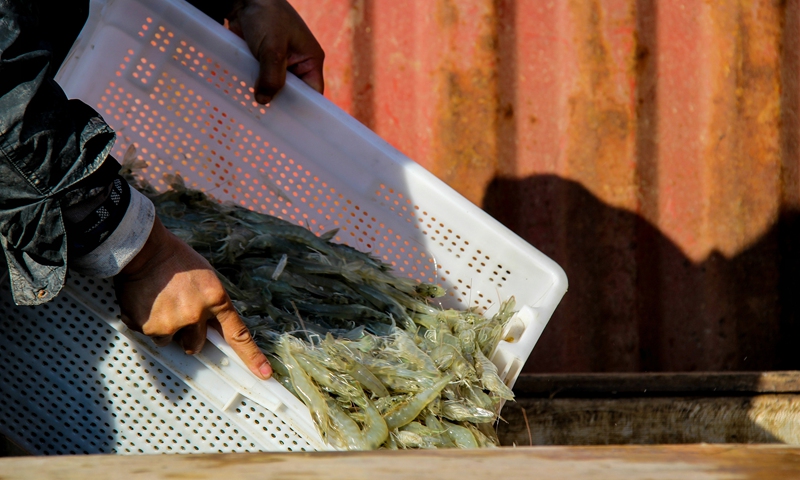
File photo: VCG
Domestic retail platforms and aquaculture firms rushed to disassociate themselves from three Ecuadorian companies after sample inspections showed their frozen white shrimps exported to China tested positive for the coronavirus on their packaging or container carrying the products.
The discovery also triggered suggestions from Chinese experts that the government further strengthen coronavirus checks on imported foods, particularly frozen packaging.
According to a statement on the website of the General Administration of Customs on Friday, six positive virus results were found on the packaging and inside containers from three Ecuadorian shrimp producers, Industrial Pesquera Santa Priscila SA, Empacreci SA and Empacadora Del Pacifico Sociedad Anonima Edpacif SA. Imports from these three firms were temporarily halted.
Chinese e-commerce giants JD.com and Alibaba's Hema Fresh both sent urgent statements concerning the safety of their shrimp products. Hema said that it doesn't sell imported products from the three companies, and the Ecuadorian shrimp it does sell have tested negative for the coronavirus.
JD.com said several rounds of nucleic acid tests on its products were all negative.
Chinese aquaculture giant Zhanjiang Guolian Aquatic Products published a statement on Saturday stressing that it had investigated the source of its products, and found that it hadn't imported any frozen shrimp after December 2019 from the three Ecuadorian firms.
Weng Qiang, a purchasing manager at Sunkfa Holding Group, a leading seafood company based in Beijing, told the Global Times on Friday that the company has sent all shrimp products for testing and none had returned positive.
While the companies' statements might help ease some worries about the safety of Ecuadorian white shrimp on the market, the regulators should be on the alert and strengthen quarantine on frozen food imports, experts said.
Hong Li, an employee of Ningbo Wanjunguoji Commodity Delivery Co, a trade transportation agency, said that most imported Ecuadorian shrimp arriving at Chinese ports are not allowed into the country out of safety concerns.
He told the Global Times Saturday that starting in June, customs have already strengthened quarantine for imported seafood, moving from inspecting and testing samples to inspection of every package.
"The inspection includes nucleic acid tests for both the packaging and the products. Sometimes customs clearing can even take two weeks to complete," Hong said.
Wu Zunyou, chief epidemiologist at the Chinese Center for Disease Control and Prevention, said that China should intensify checks for products imported from coronavirus-infected countries, particularly products with frozen packaging, or even ban those imports to reduce infection risks.
Jiao Shanwei, an agriculture expert, said that a ban or restrictions on seafood imports might cause trade friction, and it would be better to intensify customs check, or require exporters to provide proof of being free from the coronavirus contamination.
"Such moves would also dissuade domestic importers from importing seafood out of concerns about costs, delays and plunging market demand," he told the Global Times.
Global Times
